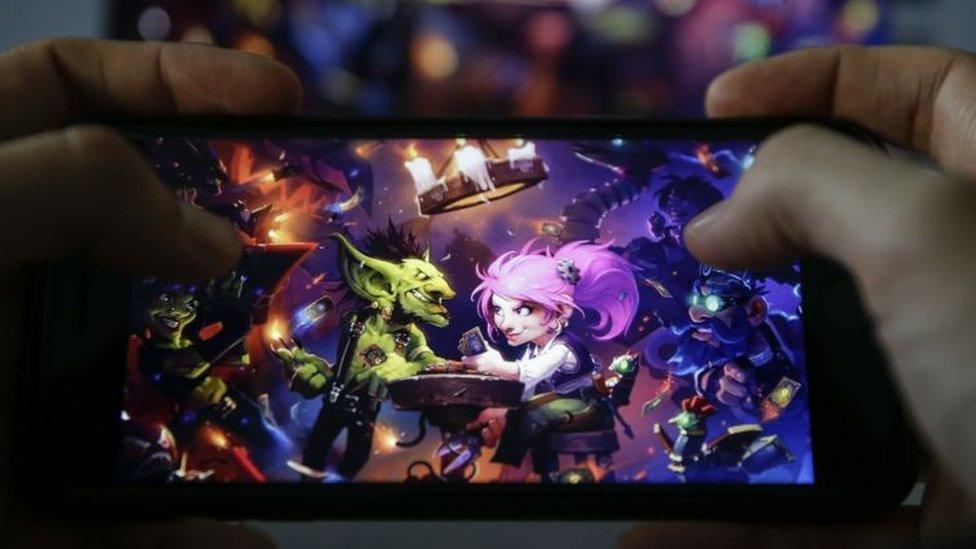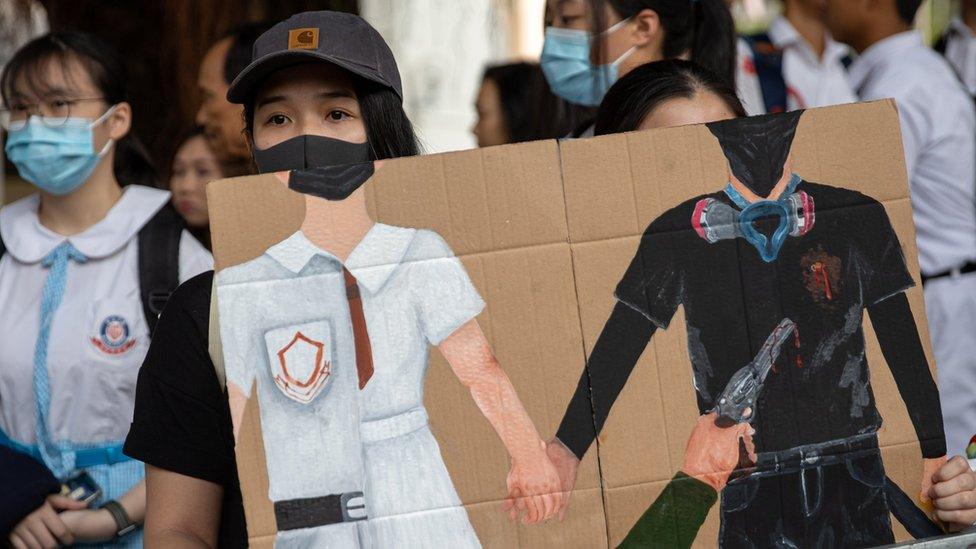Tech Tent: China and US spar over games, apps and AI
- Published

Activision Blizzard's treatment of a gamer has prompted protests
How much are Western companies are prepared to abandon their principles in order to appease the Chinese government?
In the week Apple dropped a controversial app and a games firm suspended an e-sports player for making controversial remarks about Hong Kong, Tech Tent looks at the ethical dilemmas for anyone doing business in China.

Stream or download, external the latest Tech Tent podcast
Listen live every Friday at 14:00 GMT on the BBC World Service
The app that caused Apple such a headache was called HKmap.Live, which offered real-time updates of where Hong Kong police units were stationed. Apple steered an unsteady course, first refusing to allow it on the App Store, then giving the go-ahead, and finally removing it.
Jane Li, from the Hong Kong bureau of the Quartz News site, tells Tech Tent that an editorial in the state newspaper the People's Daily describing the app as "poisonous" was probably decisive.
She suspects that the commercial implications of defying the Chinese authorities were on the iPhone-maker's mind: "Probably they would see their products or marketing activities suspended in China."
Ms Li's employer has also been caught up in the free speech row. The Quartz app was removed from China's version of Apple's App Store, again it seems following anger from the Chinese.

Some analysts believe the US and China may be about to engage in an AI arms race
Apple gave us a statement explaining that the map app violated both its own rules and local laws. It said it had verified with the Hong Kong Cybersecurity and Technology Crime Bureau that the app had been used to target and ambush police, and by criminals to victimise residents in areas where they know there is no law enforcement.
The company also said the Quartz app was taken down because it didn't comply with Chinese law.
Apple's explanations for its actions have not convinced many of its critics.
But a games company's move to censor an e-sports player has met with a much angrier response from its customers.
Activision Blizzard banned an e-sports player known as Blitzchung from its Hearthstone card game and took away his winnings after he shouted his support for the Hong Kong protests in a post-match interview on its streaming service.
Gamers have threatened to boycott Activision's other hit titles, the share price has fallen, and some employees have walked out in protest. The company is desperate to launch the mobile version of Call of Duty in the lucrative Chinese market. But with games forums outside China alive with derogatory comments about the business, it may find that its decision to ban Blitzchung does not even pay off in commercial terms.
Activision Blizzard has made no comment except to point to the Hearthstone rulebook which warns players "engaging in any act that, in Blizzard's sole discretion, brings you into public disrepute, offends a portion or group of the public, or otherwise damages Blizzard image will result in removal".
While American firms are facing ethical dilemmas in China, it has also been a tricky week for Chinese firms trying to do business in the United States, with a clutch of AI companies added to the Trump administration's banned list.
Hong Kong-based analyst Jay Huang, of Bernstein Research, tells Tech Tent he sees a widening gulf between the American and Chinese technology industries. He says a lot of American tech firms are thinking of building manufacturing sites outside China - "they worry the tariffs (imposed by the US on Chinese-produced goods) may become permanent."
As for the Chinese firms, the ban on doing business with American companies such as chipmakers may force them to develop their own components: "The signal from the US government is clear - if you don't build up your supply chain you have a bottleneck."
Just a few years ago, Silicon Valley and Chinese tech firms seemed eager to collaborate. Now, the US and China are engaged in a trade war and two separate technology spheres with very different cultures are emerging.
Stream or download, external the latest Tech Tent podcast
Listen live every Friday at 14:00 GMT on the BBC World Service
- Published8 October 2019

- Published3 October 2019

- Published10 October 2019

